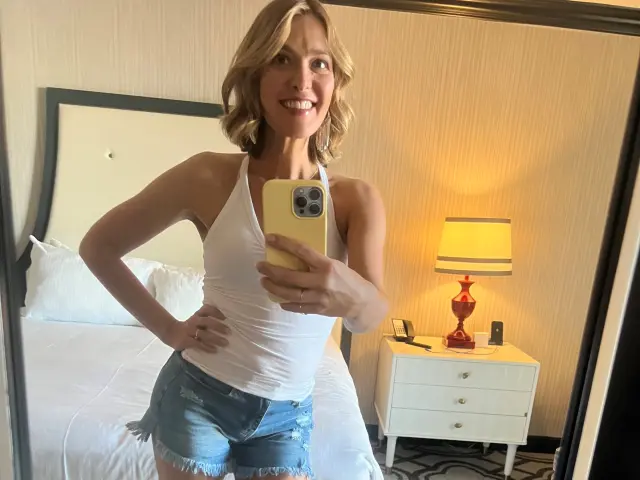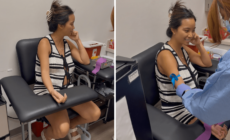-
An Ode to October Baseball - 31 mins ago
-
Child Psychologist Reveals Parenting Habits That Create Struggling Adults - 36 mins ago
-
Mom Sees Autistic Daughter ‘Shielding’ Baby Brother’s Ears—Realizes Why - about 1 hour ago
-
A Squalid Building, a Tip to the Feds, and Then ‘Straight-Up Chaos’ - about 1 hour ago
-
A Las Vegas waiter feels the ill effects of Trump’s policies - about 1 hour ago
-
Montana plane crash kills three: What we know - 2 hours ago
-
Louvre Closed After Brazen Daylight Robbery - 2 hours ago
-
Dinosaurs, unicorns and ‘raging grannies’ — but no kings — in Sacramento - 2 hours ago
-
Pregnant Mom at Hospital To Hear Heartbeat—Then Come Genetic Test Results - 2 hours ago
-
Mamdani, Jeffries and How to Beat Trump at His Own Game - 3 hours ago
I’m a Body Confidence Expert. Am I Allowed to Take a Weight Loss Drug?
The gym smelled like sweat, the squeak of kids’ sneakers cutting through the hum of parents crowded onto the bleachers. Most Saturday mornings at third-grade basketball meant small talk. Camp sign-ups, the math teacher everyone hoped to avoid, and the occasional diet tip, whispered like contraband, were all discussed. But that day, the chatter was even more superficial than usual. It floated right past the 40 pounds I’d lost.
Then a teammate’s mom slid closer, lowering her voice so the others wouldn’t hear.
“I just have to ask,” she whispered. “Are you taking Ozempic?”
Her words landed heavier than she knew. Because it wasn’t really a question about medication. It was about credibility. About whether I, someone who spends her days writing and speaking about body confidence, was now betraying the very message I’d championed.
The truth is, I was taking a glucagon-like peptide-1 (GLP-1) — Tirzepatide, to be exact. I just hadn’t been broadcasting it, because I knew exactly what people would think. Behind that mom’s question was a sharper one: How can you, of all people, take a weight-loss drug? The assumption was clear: Body confidence and medical treatment with GLP-1s can’t possibly coexist.
But that assumption says more about us than it does about me. It reveals how deeply diet culture has shaped us. It also reveals how, over time, even the body positivity movement has hardened into its own set of rigid rules.
Take Serena Williams’ recent collaboration with Ro, for example. Body positivity proponents slammed her when she went public about her GLP-1 use, even though she says the intent of her disclosure was to remove shame for other mothers who considered using the drugs.
I had my own preconceived notions about GLP-1s when I first heard the term in a “Saturday Night Live” monologue mocking celebrities who frantically raided pantries when they ran out of their injections. It was obvious: GLP-1s were for the rich and famous, wrapped in the same toxic diet culture rhetoric I’d tried so hard to reject. Worse, they were portrayed as trendy, barely regulated, and easy to get whether you needed them or not. I wanted nothing to do with them.
But I’d been working with a women’s health specialist for months, trying to get a handle on hormone shifts that were wreaking havoc on me: crushing PMS, painful periods, sleepless nights and yes, stubborn weight gain. One day, my provider gently suggested a GLP-1 might help.

At that point, I was at my heaviest — almost 200 pounds — and feeling stuck. Not just about how I looked, but how I felt in my own skin. The past year had been relentless: a major move, the loss of our longtime child care provider, and a body that had morphed seemingly overnight thanks to perimenopause. I kept working through all my life changes with a therapist but also took some steps toward coping that ended up backfiring. In a full rejection of diet culture, I tried intuitive eating. I let myself eat whatever I wanted.
Intuitive eating can be a powerful strategy for addressing disordered eating, but it brought its own complications for me. First, what I wanted was mostly salt and sugar since I was so stressed out — comfort foods I’d long denied myself as a chronic dieter. Second, years of metabolic damage meant my body didn’t know what to do with the sudden influx. It clung to every calorie like a toddler clutching their mom at daycare drop-off.
My shoes didn’t fit. It felt like I gained five pounds from a single blueberry muffin crumb. My knees ached. It wasn’t just about accepting a “mom bod” anymore — this was a body that was changing beyond recognition, and fast. Every glance in the mirror made me feel disconnected. I wanted to love my body, but I also didn’t want diabetes. Or arthritis. Or, to be frank, a whole new wardrobe every three months.
My first questions were practical: Could I handle giving myself shots? Would I feel sick? But the fears turned out to be mostly unfounded. Weekly injections were manageable. So were the side effects. Physically, I felt better fast. My knee pain vanished. Sleep got easier. And yes, slowly I returned to a weight where I could look in the mirror and recognize myself.
But the real shift came four months in, sitting on the couch playing Uno with my daughter. I realized I hadn’t thought about food all day. Not once. I had eaten breakfast, lunch and dinner — without guilt. Without overthinking. Without judgment. I got hungry, I ate and I moved on. For someone who had lived with food noise — the mental burden of constantly monitoring what to eat, what to avoid and how to compensate later — for decades, the silence was profound. It reminded me of patients with anxiety who describe their first weeks on SSRIs. What’s most noticeable is what’s missing: the constant mental churn.
And unlike my past dieting days, I wasn’t depriving myself. I could eat a cookie or a slice of pizza and be satisfied. For the first time, I was eating in response to true hunger cues, not emotional ones. Food became nourishing — safe, even. I enjoyed mealtimes with my children. And the best part? I trusted myself around food for the very first time in my life.
Diet culture is obvious in its cruelty. It tells us thinner is always better, that willpower equals worth and that suffering is noble. I lived that script for decades through my youth and into early motherhood, wishing my “mom bod” would disappear. I tracked calories, punished myself with exercise, obsessed over every bite. And in the end, diet culture failed me.
But once I started a GLP-1, I realized the dogmatic version of body positivity I’d tried next had failed me, too. What began as a radical, liberating movement — affirming that all bodies deserve dignity and care — had hardened into its own unspoken rules. If diet culture told me, “You’re only worthy if you shrink,” body positivity whispered, “Taking a medication like Ozempic is a betrayal — proof you don’t really love yourself.” And that, I realized, was just another way of policing women’s choices and keeping us confined.

We don’t shame people with diabetes for taking insulin. We don’t tell people with ADHD to “just focus harder” instead of using medication. But when it comes to body image struggles, suddenly the same rules don’t apply? That doesn’t make women empowered; it leaves them trapped, with no room for nuance, complexity or individual choice.
Women deserve lives that feel full and free. If that means using support or tools along the way, so be it. For me, that tool was a GLP-1. It quieted my food noise, gave me back the freedom to move my body for joy instead of punishment and helped me model a healthier relationship with food for my kids. My hope is that my example will help protect my daughters from facing the same struggles I did. But if, when they are older, they would benefit from a GLP-1, I would support them using it.
My choice isn’t right for everyone. While GLP-1s can help reduce compulsive thoughts about food in many, the appetite suppression might trigger old patterns for others, especially those with a history of binge eating disorder or restrictive eating. Working with a medical and mental health team is important as you make your own decision. But my choice is right for me, which is all that should really matter.
Am I a hypocrite for being a body confidence expert on a GLP-1? No. The real hypocrisy is a culture that judges women no matter what we do — gain weight, lose weight or stay the same. And I refuse to let that culture have the last word.
Am I a hypocrite for being a body confidence expert on a GLP-1? No. The real hypocrisy is a culture that judges women no matter what we do — gain weight, lose weight or stay the same. And I refuse to let that culture have the last word.
So, the next time someone asks, “Are you taking Ozempic?” like it’s a scandal or a shortcut, I’ll say what I wish I had that day: “Yep! I’m taking care of myself. And I’m not whispering about that anymore.”
Because maybe the most body-positive thing any of us can do is to be loud about the ways we’re choosing our own peace.
Whitney Casares, MD, MPH, FAAP, is a practicing, board-certified pediatrician, podcaster and CEO and founder of Modern Mommy Doc. She is a spokesperson for the American Academy of Pediatrics and the author of several books including “My One-of-a-Kind Body.”
All views expressed in this article are the author’s own.
Do you have a personal essay you want to share with Newsweek? Send your story to MyTurn@newsweek.com.
Source link




















